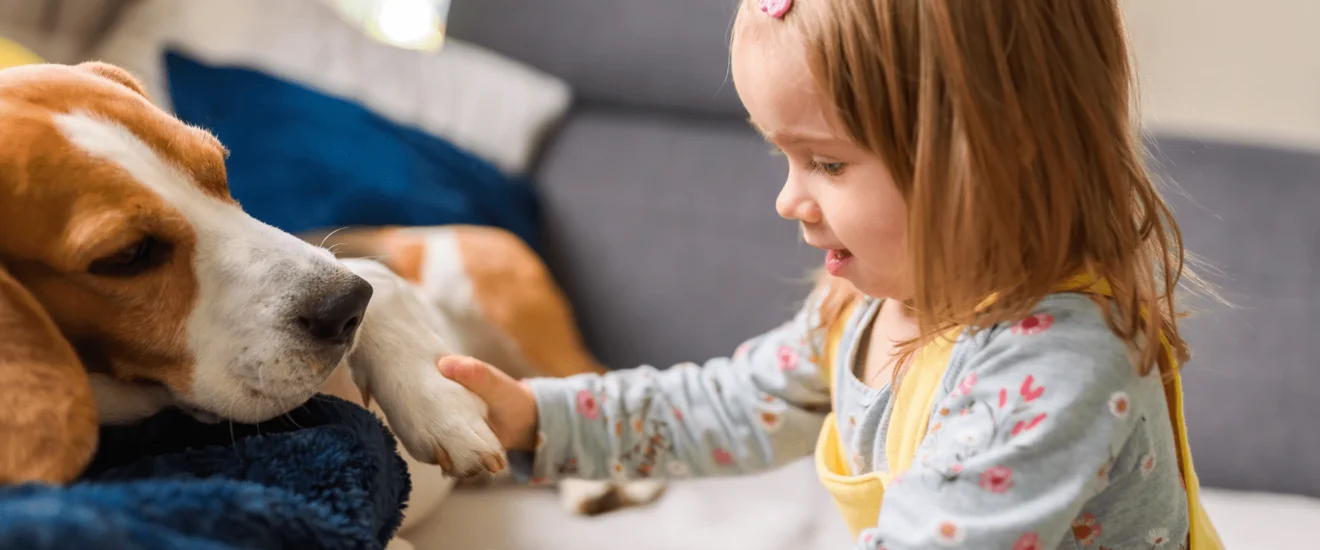Are you thinking of adding a pet to your household? If you have a child with autism you may be wondering if a pet is a good option and how to choose the right pet for your child.
Pets can be a wonderful addition to your household and offer many benefits for children on the autism spectrum from companionship to reduced anxiety and improved physical activity.
Keep reading to learn more about how a pet can benefit your child as well as some things to consider before choosing a pet.
Benefits of Pets for Children with Autism
While a pet can be a great companion for your child with autism, the benefits don’t stop there. Pets can help a child with autism:
- Improve Social Skills: Studies have shown that children with pets are more likely to engage in social interactions like introducing themselves and asking questions.
- Reduce Anxiety: Whether they are watching fish or petting a furry animal, different pets can have a calming effect on children and help reduce anxiety.
- Learn Responsibility: A pet can give your child a sense of responsibility and pride as they help take care of their pet’s needs.
- Increase Physical Activity: Many pets require physical activity. Owning a pet can help encourage and increase your child’s physical activity.
Questions to Consider Before Choosing a Pet for Your Child with Autism
Adding a pet to your household can be a big commitment in both time and money. Before picking a pet for your child you should consider the following:
- What are your child’s needs and abilities? Before choosing a pet you want to think about all your child’s unique needs and abilities. For example, is your child sensitive to noise? If so you may not want to get a dog that may bark a lot.
- How much time do you have to spend on a pet? Is your child involved in a lot of activities or therapies? How often is your child at home? If your child’s day is usually filled with different activities and appointments is there anyone else home to take care of a pet during the day? If there isn’t anyone in the household with time available to commit to a pet, you may want to consider a more low-maintenance pet such as a fish or possibly a cat.
- How much space do you have for a pet? Some pets require more space than others. Do you have a big backyard for a dog to run around in or do you need an indoor pet? If you’re thinking about fish or maybe a guinea pig where in your home can you place the cage?
- How much will the pet cost? Pets cost money. Adoption or purchase fees, housing (cages, tanks, beds), and toys. You also have to think about food as larger animals will eat more, and things like veterinary bills. Some pets are more prone to illness and injury or may need regular vaccinations.
- Does anyone in the household have allergies? Is anyone in your home allergic to cats or dogs? Beyond that, you also need to think about things like fur, dust, and other particles your pet may track in. Some pet foods use things like peanuts, and guinea pig or hamster cages are often filled with sawdust. Think about all aspects of a pet and any allergies or sensitivities of household members.
- What experience do you have with animals? Did you have any pets growing up? If you can, and they match your child’s needs, starting with pets that you are already familiar with is a great place to start.
- Do you know anyone with the pet you are considering? Think about friends and family nearby that have pets. If you can let your child interact with the pets you are thinking about getting first. See how your child reacts to and interacts with different animals before committing to a new pet.
5 Best Pets for Children with Autism
Now that you know the benefits of owning a pet and the things to consider before choosing a pet, here are five of the best pet options for children with autism.
1. Dogs
Dogs may be the first pet that comes to mind when you start thinking about choosing a pet for your child with autism. They are of course “man’s best friend” and the original service companion for individuals with special needs.
Many dogs are calm, sociable, trainable, and people-oriented; however, specific traits can vary greatly by breed type and a dog’s personality.
The wide array of dog breeds makes this a very customizable pet option for neurodiverse families to consider. Some breeds are small like chihuahuas or beagles. Other breeds are large like labradors or German shepherds. Some require lots of exercise and others are more lap dogs. The differences go on and on, so before choosing a dog be sure to thoroughly research the breeds you are considering.
2. Cats
Another common pet to consider is a cat. Most cats are fairly independent, making them a more low-maintenance option. Some cats, depending on their unique personality, can be left alone for hours, as long as they have access to food, fresh water, and somewhere to use the toilet. Other cats may be a bit needier.
Studies have even shown that children on the autism spectrum may prefer cats over dogs.
3. Turtles
Turtles can be a great low-maintenance option for a neurodiverse family, especially smaller species. Unlike many other pets, turtles do not need regular exercise or grooming.
Turtles do require a somewhat complicated habitat, but once that is set up maintenance is fairly easy. Your turtle’s water will need to be changed weekly and the tank will need to be cleaned every other week.
Turtles do require ample space, both dry and wet, so keep that in mind when choosing a species. Also, not all turtle species require the same type of water. Depending on the species you choose your pet turtle may need fresh, salt, or brackish water.
4. Fish
Fish can be a good way to introduce your child to pets. They are usually inexpensive to care for and often have a shorter lifespan, making them less of a commitment.
However, because your child can’t directly interact with them their benefits are limited. They can be very calming to watch and if your child is up to it, feeding the fish daily can help teach them responsibility.
5. Guinea Pigs
Guinea pigs are very social animals that love to be pet, held, and played with, making them a great choice for kids who want to be able to interact with their pets, but may not have much space.
They can be considered high maintenance, however. Their cage must be cleaned daily and they can become depressed when living alone, meaning you may need to purchase two to live together.
Conclusion
Whether you decide to choose an option from our list or something completely different, adding a pet to your household can be very beneficial for your child with autism. However, it is important to take the time to choose the pet that fits your family’s needs, experience, and lifestyle.






